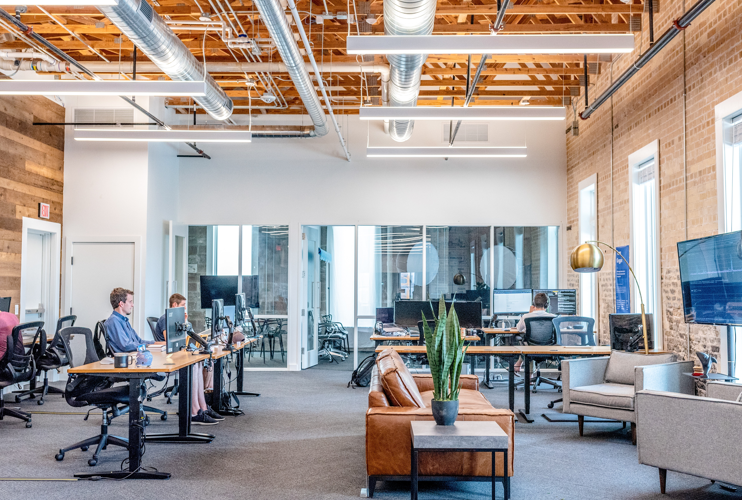Over the past few months, we have seen the impact of the pandemic across several industries all over the world. Businesses have been gravely affected, communities have been strengthened, and initiatives have been taken in response to these changes. In April, we looked into the Coliving industry; the positive response to the crisis and the various avenues through which some spaces kept their locations open and running.
Now we offer our platform to experts in the Coworking industry. To do this we invited DropDesk—New York-based real estate marketing agency & the creators of the DropDesk coworking management software. Graham Beck, Founder of Dropdesk has penned his views for us on the impact of COVID-19 on the Coworking industry.
Read ahead to find out why the industry is here to stay, and how it has been changed forever, according to Graham:
I have been getting a ton of questions lately about how COVID-19 will impact the Coworking industry. Being both a coworking space operator and a part of a technology company that supports shared workspaces, I thought it was time to provide some insight and set expectations.
For obvious reasons, any community or location that brings together vast amounts of strangers is due for disruption with the current state of affairs, but what will the impact be for the long-term on the industry as a whole?
How Coworking has been impacted
Coworking spaces rely on selling both open space memberships to small businesses, as well as private spaces to companies of all sizes. The industry has often been criticized on the sustainability of signing long-term leases with landlords and short-term leases to members or tenants. This model places the burden on the spaces themselves while giving members the flexibility to cancel or upgrade their memberships.
There have been very little studies or information on what the impact will be as a whole with an economic downturn and other large coworking companies that have boosted economic resilience, have shown that this is simply not the case.
So will coworking and remote workers be affected? Of course. Coworking spaces in New York City are actively navigating the stay home climate by negotiating with long-term members on lease discounts or membership suspensions to ease the bleed. Occupancies have dropped across the board by 40%-60% (with a focus only on servicing essential companies), cutting communities in half.
Workspaces that have been struggling to keep their head above water, who are unable to take advantage of government or SBA loans, will, unfortunately, meet their end.
With all the above, it might be difficult to see a light at the end of the tunnel, but I can assure you that there is, and we will all get through this.
Why Coworking is here to stay
1. Everyone has to work, period.
Whether remote or in an office, businesses that have never embraced remote work are now being forced to do so at rapidly expanding numbers. With remote work being a new norm, once the pandemic clears, companies will look to coworking spaces as a feasible alternative. Shared workspaces are a major catalyst that helps spur remote productivity at a local level.
2. We can do without the commute
With the spread of COVID-19, people are looking to avoid close proximity to public transportation such as a packed subway or train. Biking or walking to a local workspace sounds much better (healthier to say the least and better for the environment!).
3. Flexibility will always be in demand
Businesses who have signed long-term lease agreements will start to rethink their options when it comes to finding space (especially at a time like this).
4. Community cannot be replaced
One of the major reasons companies choose coworking spaces is for the sense of community. If you are a remote employee or freelancer, what is better than working and having conversations with like-minded professionals? You can dress up a volleyball and call it Wilson, but you cannot replace real human connection.
5. Small communities need them
It is a fact that coworking spaces attract jobs, companies, and economic activity to their local towns. They serve as an anchor to retain business, especially within suburban regions.
How remote teams have evolved
Being able to remotely meet, log tasks, and secure employees have been popular topics. So what can you do as an employer to ensure your team is just as productive as they were before?
1. Utilize remote collaboration tools for video conferencing such as Zoom.
2. Protect employee logins and sensitive material by verifying employees are who they say they are, using identity verification tools like Ipsidy.
3. Document processes using project management software tools like Trello.
With all being said, there seems to be a bright future ahead for the adoption of remote work and expansion of coworking spaces.
This article was supplied by Graham Beck, Digital Marketing Expert and Founder of DropDesk, a platform that offers solutions for coworking spaces, local businesses, and remote teams.
To read more about SALTO KS, click here or follow us on Instagram and LinkedIn for the latest product features, team updates and news from the industry.
SALTO KS provides a flexible access control management system that requires no software installation or the added expense of a fully-wired electronic product. Modern cloud-based, wireless access control systems are easy and simple to use for businesses including Coworking Spaces, Coliving Buildings, Purpose Built Student Accommodation, Retail, Multi-Tenant Housing, Gyms and many more. Our best in class wireless access control solution and smart locks guarantee the efficiency for your business. Integrate smart locks, start easily managing wireless access control now!

